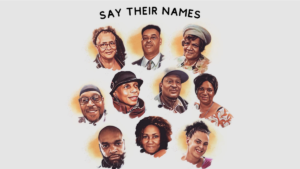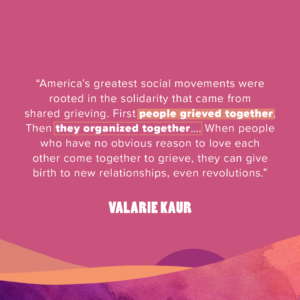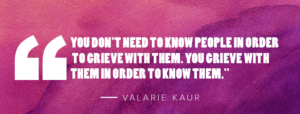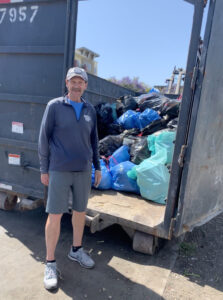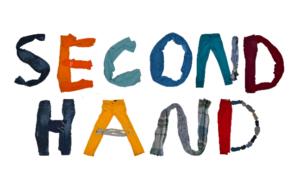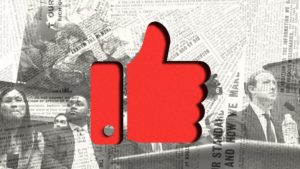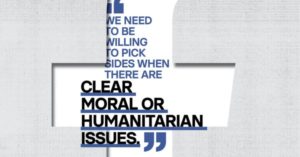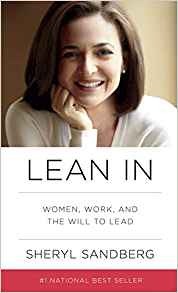Peter Thiel
Saturday, May 21, 2022
May 21, 2022To solve humanity’s problems, we need well-functioning brains…eating and living well with kindness and awareness…always compassion…building our brain architecture.
Tending body is tending to the self, and tending to the self is tending community, tending community is tending country.
[On Being]
J
O
Y
“The joy of life is to put out one’s power in some natural and useful or harmless way.”
-Oliver Wendell Holmes
Valerie Kaur
Oh my loves.
“They’re going to keep killing us.” This was my first thought after the news broke about the shooting at a grocery store in Buffalo. Terror and fatigue.
I’ve organized around white supremacist hate for 21 years, since before this gunman was born. The killings have become more frequent, more effective, and more efficient at taking life. I got the news while working on a memorial video on the white supremacist mass shooting in Oak Creek 10 years ago, revisiting all that pain. How to feel fresh grief when we are already in grief? How does the heart expand, instead of shut down?
Revolutionary love is the choice to labor for others, opponents, and ourselves. What is your role right now?
Will you focus on others? Grieve with Black people, show up to local vigils and gatherings, listen to the stories, fight for anti-racist policies, build new relationships of solidarity. Do one thing in your sphere of influence — your school, workplace, house of worship, or home — to stand in love.
Will you focus on opponents? The gunman cited “replacement theory” in his manifesto, a theory that nearly one in three Americans believe. Reach out to the colleagues, neighbors, relatives in your life who subscribe to this dangerous and racist belief. Open a channel for deep listening, share stories, stop the spread of misinformation.
Will you focus on your body and your people? If you can feel how this shooting touches trauma in yourself and in people you love, this is the time to make space for healing. Grieve and rage, wail and scream, rest and breathe. Be with people who make you feel safe. Let in softness and love into the places that ache. Together, we survive this. {And what is yet inevitably to come. -dayle}
[1,000,000 + have died from COVID. 1 in 3 U.S. citizens believe the plague has ended. It has not.]
More from Valerie:
Where do you notice feeling grief in your body? What is the quality of that grief? What is the shape of grief inside of you? If it feels uncomfortable, take another deep breath and stay with it. Breathe through it.
What does your body need to be brave with this grief? What do you need to feel it and to move through this energy? What rituals are you called to? Who do you need by your side.
Who have you not yet grieved with? Whose story have you not fully let into your heart? What community’s struggle have you not fully taken in? Notice what is happening in your body. If your fists tighten, or your heart beats fast, or if shame rises to your face, it’s okay. Breathe through it. Trust that you can. The heart is a muscle: The more you use it, the stronger it becomes. You don’t need to know people in order to grieve with them. You grieve with them in order to know them.
What do you need to do to be able to grieve with them? What vigils or marches need you? What houses of worship are you ready to visit? What phone call are you ready to make? You can begin where you are, with a simple text or email, saying to someone “I’m here for you.”
How to be brave with your grief.
https://valariekaur.com/2022/04/how-to-be-brave-with-your-grief/
“Loving someone means that one day, there will be grieving. They will leave you, or you will leave them. The more you love, the more you grieve. And so I invite you to honor your grief: it’s a sign of how deeply you have loved.”
-Valerie
Community, then country.
Coronado Times
Meet Brian Trotier
Triangle Project, located in the East Village of San Diego, just across the bay.
“The Triangle Project is a pilot program created to help improve the lives of unhoused people. Brian has been helping out in this area for about fifteen years and has developed relationships with many of the residents. A huge issue has been the trash in the area. The residents, mainly living in tents, don’t have a place to dispose of their trash which is unsightly, unsanitary, and demoralizing for them. Richard Aaron Horton, 64, a longtime resident, started improving the area by picking up trash. Brian Trotier knows Richard well and has expanded the effort by securing funding from the Lucky Duck Foundation. This local foundation focuses on the homeless and has contracted with EDCO for a dumpster to collect the trash.
The concept is simple, and the results so far have been amazing. Brian reported that, as of last week, the Triangle Project had collected in the previous 20 days, 3,794 bags of trash weighing a total of 23.89 tons. It is likely that much of this, including plastic, would have found its way into our bay and ocean. Here is how it works: every Monday and Thursday, EDCO drops off a dumpster at 8 am. Brian brings bags, gloves, and a stack of cash. Volunteers walk around the area greeting residents and asking if they’d like trash bags. For almost all, the answer is an enthusiastic “yes!” Residents get to work cleaning up their neighborhood. For every full bag of trash they bring to the dumpster, Brian gives them $2. The roughly two-block area goes from being very littered to being very clean within an hour.”
“riangle Project’s results are about double what Brian and Lucky Duck projected, and the benefits have gone far beyond a cleaner neighborhood (and bay). Residents express appreciation for being seen; they get along better with each other. “They have a common enemy—trash,” Brian acknowledged.”
“Keeping the Earth clean. That’s what’s happening in the long run. It’s a domino effect.”
https://coronadotimes.com/news/2022/05/18/meet-emerald-keeper-of-the-month-brian-trotier/
The Independent
My Carbon Footprint: the rise of the nearly new
by, Kate Hughes
“So often, being more eco is inaccurately pinned to greater cost, when actually – especially when it comes to everyday buying decisions – the opposite is true.
This widespread, if subtle shift in the way we shop, including the disintegration of the stigma around nearly new, vintage, and preloved may well have some relationship with the climate crisis but make no mistake, this is largely financially led.
What I love about second-hand too, is that it doesn’t preclude us from layering up further planet and cash-saving approaches.
When the old boy on our street moved into a retirement flat the neighbours bought his lawnmower off him. There’s now one lawnmower between five households, saving space, cash and helping maintain and develop lines of local communication and a sense of community.
More than four in 10 of us gave goods away for free locally in the first few months of the year, while half donated products to charity and more than a third even made financial donations despite experiencing hardship.
Free stuff – everything from haircuts to sofas are also on the rise, the site reports.
So go forth and embrace the charity shop, the quirky apps, the leviathan websites.”
HuffPost
Living With The Far-Right Insurgency In Idaho
A radical GOP faction, in open alliance with extremists, is seizing power and targeting its opponents with cruelty.
Some wonder: Is it time to leave? (Yes. It is.)
Jennifer Ellis, photographed in her home on April 3, 2022, created Take Back Idaho to push back against the right-wing, extremist views and tactics that have dominated the state’s politics.
‘A lot has been written about both the radicalization of the Republican Party and the decline of democracy in the U.S. — about the country being at a precipice. It’s maybe easy for those warnings to become background noise, or to dismiss them as doom-mongering pieces of clickbait. But in Idaho, the nightmare scenario is crossing into reality, as an authoritarian GOP sets about to create a whiter, Christian nation.
These MAGA radicals have gestured at the future they want: no rape and incest exceptions to Idaho’s abortion ban; no emergency contraception; no gender-affirming health care for minors; the banning of books; the jailing of librarians; and maybe no public education altogether.
I recently spent a week traveling across the state, from Sandpoint in the northern panhandle down through the green slopes and whitewater of Hell’s Canyon to the plains of Ada County, and then across lava rock and sagebrush to Blackfoot. In all these places, Democrats and more moderate Republicans view Tuesday’s primaries as an existential affair. Some are considering leaving the state if MAGA extremists consolidate more power. Others are digging in their heels.
The people I talked to were not all that accustomed to alarmism, which made it striking to hear some of their voices tremble when they talked about what’s happening to their home. Their message for the rest of the country? It’s gonna get bad. The GOP really will go that far.
“They have completely rebranded what it is to be a conservative here in north Idaho, and they have literally excommunicated and cleaned house of any rational, regular conservative from their ranks.”
– Shawn Keenan, local Democratic activist
“As much as I want to point to examples of their adverse impact on the legislative process — and there’s many things to point to — part of me, the social scientist in me, the military veteran in me, wants to, you know, not just hate the player, but hate the game,” said Mathias, who served in the Coast Guard and has a Ph.D. in public policy.
A grading system like the Freedom Index makes the often inscrutable process of legislating more accessible to voters, Mathias said, and the IFF is an outrageous arbiter.
Mathias is intimately familiar with the group. Last spring, he watched state Rep. Ron Nate (FI Score: 97%) and other far-right legislators manufacture a racist moral panic about Boise State University indoctrinating students with “critical race theory.” (It was not.) Nate, using talking points lifted from an IFF white paper, argued for cutting part of the school’s budget.
Mathias says he typically likes to “keep his powder dry” in the statehouse — Democrats are such a minority there, it’s not worth the fuss to debate every proposal — but in this case, both as the only Black man in the legislature and as a Boise State alumni, he felt compelled to speak.
Going to Boise State on the GI Bill, he told his colleagues in a speech on the House floor, pausing to fight back his emotions, “provided opportunities I’d never seen in my life. It changed my life.”
Critical race theory, he continued, simply recognizes that there are institutional biases — in “housing, health, education, wealth, income,” Mathias said — that have existed since our country was founded. “People of color always come out on the losing end,” he added, his voice breaking. “Always. And I don’t think it’s unfair to acknowledge it.”
Across Idaho, the far right has laid siege to nonpartisan positions, some of which require specific expertise, and made them partisan, installing loyalists with sometimes disastrous results.
A recent Vanity Fair piece, for example, profiled members of the national neoreactionary movement, acolytes of a philosopher named Curtis Yarvin, who is a close ally of billionaire Peter Thiel. This movement, which has buy-in from powerful GOP figures, is explicit about wanting to usher in the end of democracy by purging the current government of its enemies and establishing one-party control — or, put another way, authoritarianism.
J.D. Vance — the venture capitalist and “Hillbilly Elegy” author who recently won the Ohio Republican primary for U.S. Senate — is a follower of Yarvin’s. He positively likened this prospective purge to the deadly “de-Baathification of Iraq.”
“I think Trump is going to run again in 2024,” Vance told Vanity Fair. “I think that what Trump should do, if I was giving him one piece of advice: Fire every single mid-level bureaucrat, every civil servant in the administrative state, replace them with our people.”
Vance and Trump might look to north Idaho for inspiration.
“We’re losing here. We’re losing our state. We’re losing our town. … It’s just becoming overwhelming.”
– Sandpoint Mayor Shelby Rognstad
Full report:
https://www.huffpost.com/entry/far-right-idaho_n_628277e2e4b0c84db7282bd6/amp
#DeleteFacebook
January 1, 2020New Year’s Eve 2019.
Hi friends. This is my final post on fb. 2.2 billion people, a third of humanity, log on across the planet every hour, I don’t think Zuck will miss me much. Nonetheless, 17 million Americans have left FB in the last two years because of disinformation and political manipulation. Mark Zuckerberg made an additional $27 billion last year alone; he won’t be changing his behaviors any time soon. He throws all that he does under the free speech/innovation bus. His modus operandi has always been to act first, apologize later. Literal early company motto: ‘Move fast and break things.’ Based on past behaviors and weak rhetoric, I don’t think he has the moral compass to steer a moral path. He doesn’t have the emotional or compassionate intelligence to consider the meaning of truth, the limits of free speech, and the origins of violence. Peter Thiel, a billionaire who sits on his board, is the guy who once wrote democracy was weakened when women received the right to vote. Good guy. Zuckerberg is now at the center of a full-fledged debate about the moral character of Silicon Valley and the conscience of its leaders.
In their opinion piece for January 1st, 2020, Idaho Mountain Express offered their New Year’s resolution for fb and Zuckerberg: “To take legal responsibility for what his platform has wrought by making it a publisher instead of a filthy rich exploiter of unsuspecting Americans.” Right on.
In 1915, Louis Brandeis, the reformer and future Supreme Court Justice, testified before a congressional committee about the dangers of corporations large enough that they could achieve a level of near-sovereignty “so powerful that the ordinary social and industrial forces existing are insufficient to cope with it.” He called this the “curse of bigness.” Tim Wu, a Columbia law-school professor and the author of a forthcoming book inspired by Brandeis’s phrase, said “Today, no sector exemplifies more clearly the threat of bigness to democracy than Big Tech.” He added, “When a concentrated private power has such control over what we see and hear, it has a power that rivals or exceeds that of elected government.”
A healthy market should produce competitors to Facebook that position themselves as ethical alternatives, collecting less data and seeking a smaller share of user attention. Like it or not, Zuckerberg is a gatekeeper. The era when Facebook could learn by doing, and fix the mistakes later, is over. The costs are too high, and idealism is not a defense against negligence.
I’ll miss my connections on this platform, my ol’ radio buds, sorority sisters, our community…I even reconnected with a dear junior high school friend from San Diego. We were 14 years old when we met. I will miss the ease in posting and sharing information. I remain hopeful someone will create a new social media site that will allow us to have a nonaddictive, advertising-free space that guards against foreign influence and disinformation, honoring privacy and our personal data. From Free Press: ‘We must have control over how our personal information is used, and prohibit its use to build systems that oppress, discriminate, disenfranchise and exacerbate segregation.’
I don’t Instagram or engage on WhatsApp…all Zuckerberg. I stay with twitter, where I follow various news organizations and journalists, because owner Jack Dorsey has committed to eliminating political ads and just recently launched a research project called Bluesky, researching decentralized technical standards for social media platforms making it easier to enforce rules against hate speech and other abuses.
The early hope for internet democracy has evaporated into a dystopian space that has weakened our democracy with dangerous disinformation, false political ads and foreign algorithms. We haven’t even begun to deal with ‘deep fake’ video yet, given media in general, the press specifically, have not found a way to authenticate what’s real and what isn’t. This virtual mess is only going to get worse.
In India, the largest market for Facebook’s WhatsApp service, hoaxes have triggered riots, lynchings, and fatal beatings. Local officials resorted to shutting down the Internet sixty-five times last year. In Libya, people took to Facebook to trade weapons, and armed groups relayed the locations of targets for artillery strikes. In Sri Lanka, after a Buddhist mob attacked Muslims this spring over a false rumor, a Presidential adviser said, “The germs are ours, but Facebook is the wind.”
Nowhere has the damage been starker than in Myanmar, where the Rohingya Muslim minority has been subject to brutal killings, gang rapes, and torture. In 2012, around one per cent of the country’s population had access to the Internet. Three years later, that figure had reached twenty-five per cent. Phones often came preloaded with the Facebook app, and Buddhist extremists seeking to inflame ethnic tensions with the Rohingya mastered the art of misinformation.
Beginning in 2013, a series of experts on Myanmar met with Facebook officials to warn them that it was fueling attacks on the genocide. David Madden, an entrepreneur based in Myanmar, delivered a presentation to officials at the Menlo Park headquarters, pointing out that the company was playing a role akin to that of the radio broadcasts that spread hatred during the
In 2011, the company asked the FEC [Federal Election Commission] for an exemption to rules requiring the source of funding for political ads to be disclosed. In filings, a Facebook lawyer argued that the agency “should not stand in the way of innovation.” Another default argument. It became a running joke among employees that Facebook could tilt an election just by choosing where to deploy its “I Voted” button.
The 2016 election was <supposed> to be good for Facebook. That January, fb COO and billionaire Sheryl Sandberg told investors that the election would be “a big deal in terms of ad spend,” comparable to the Super Bowl and the World Cup. According to Borrell Associates, a research and consulting firm, candidates and other political groups were on track to spend $1.4 billion online in the election, up ninefold from four years earlier.
During the campaign, Trump used Facebook to raise two hundred and eighty million dollars. Just days before the election, his team paid for a voter-suppression effort on the platform. According to Bloomberg Businessweek, it targeted three Democratic constituencies—“idealistic white liberals, young women, and African Americans”—sending them videos precisely tailored to discourage them from turning out for Clinton.
***Theresa Hong, the Trump campaign’s digital-content director, later told an interviewer, “Without Facebook we wouldn’t have won.”***
Facebook admits a pro-Trump media outlet used artificial intelligence to create fake people and push conspiracies.
In September of 2017, after Robert Mueller obtained a search warrant, Facebook agreed to give his office an inventory of ads linked to Russia and the details of who had paid for them. In October, Facebook disclosed that Russian operatives had published about eighty thousand posts, reaching a hundred and twenty-six million Americans.
Last year, Facebook spent $11.5 million on lobbying in Washington, ranking it between the American Bankers Association and General Dynamics among top spenders. Money…I mean, power and greed…along with behavior modification technology… pretty much defines how we landed here. FB is the epicenter of persuasive technology.
#2020 is going to be a ride. Buckle up. Stay vigilant. Be proactive consumers of news and information. Take the Pro-Truth pledge. And V O T E. It is imperative we remember our democracy is fragile and it fails without ‘we the people.’ Activist Greta Thunberg wrote today, “This coming decade humanity will decide it’s future. Let’s make it the best one we can. We have to do the impossible. So let’s get started.”
I’ll miss you, my fb friends. Happy New Year. Be safe. Only peace.
~
[In context of fb’s persuasive behavior modification techniques, my pages will stay active for about 30 days and then evaporate. If I log on anytime during those 30 days post depletion, the pages will re-activate, so I won’t be able to read any comments to my final fb post. Just email me, dayle.cafe@icloud.com, follow me on twitter, @DayleOhlau, or my website, daylescommunitycafe.com. ♡]
protruthpledge.org
The Public Square of Spirit & Compassion & Disinformation
November 21, 2019Sister of Social Service Simone Campbell of Social Service Simone Campbell is an author, lawyer, poet, and Executive Director of NETWORK, an organization that lobbies on issues of economic justice, immigration reform, and healthcare.
My faith impels me into the public square. It is abundantly clear that Pope Francis is correct when he says that faith has real consequences in the world . . . and these consequences involve politics. . . . Religion/politics is at the heart of my contemplative practice. I am nourished daily by the people I meet and whose stories I hear. My heart is broken open by the truth of their hunger and hope. It is not a theoretical reality for me. My meditation has become breath, that we might see, that we might walk, and, in the process, heal our society that is famished for community and knowing that we belong to each other. . . .
No one can be left out of my care. Therefore [our] political work is anchored in caring for those whom we lobby as well as those whose cause we champion. This was illustrated for me recently when I was . . . lobbying a . . . Senator. . . . I commented on the story of a constituent and asked her how her colleagues could turn their eyes away from the suffering and fear of their people. The conversation went on a bit, and then the senator came back to my question. She said that . . . they did not get close to the candid stories of their people. In fact, some did not see these constituents as “their people.” Tears sprang to my eyes at her candor and the pain that keeps us sealed off from each other because of political partisanship. . . .
In many ways, we are a bit like the senators who close themselves off from the needs of their constituents. We could get caught in the pain of rejection and blame, fighting against an unjust judgment. But for me, the contemplative perspective leads to letting go of my desires and control while opening to the gift of the moment. My consistent learning is that behind the loss is always a surprise, opening into something new. There are prices to be paid, but they are small when compared to the hunger of our people. . . .
My prayer has led me to compassion. Compassion often leads to much more nuanced analysis. . . . The Spirit has pushed us out of our comfort zone of acceptability in order to meet the needs of people we had not known were ours. . . .
-Center for Action and Contemplation
As a platform for disinformation, it is a weapon. To be used intentionally as a platform for disinformation, it is an atomic bomb.
AXIOS
Ad targeting is how Facebook, Google and other online giants won the internet. It’s also key to understanding why these companies are being held responsible for warping elections and undermining democracy, managing editor Scott Rosenberg writes in the opening installment of our “What Matters 2020” series.
- Critics and tech companies are increasingly considering whether limiting targeting of political ads might be one way out of the misinformation maze.
- Giant platforms would still allow campaigns and candidates to purchase political ads — but the companies would stop (either voluntarily or by law) selling messages aimed only at narrow segments of the electorate.
How ad targeting works: Facebook and Google have somewhat different systems for targeting ads, but both allow advertisers to bid on narrowly defined demographic groups or keywords.
- For instance, you can tell Facebook to show your message only to Southern men who don’t have a college degree and earn less than $75,000 — or ask for married suburban moms in three ZIP Codes outside Indianapolis who own SUVs and play tennis.
- In the political ad world, these tools allow candidates and groups to exploit those populations’ anxieties and resentments, efficiently.
The link between ad targeting and misinformation … Tech platforms stand accused of multiple sins, including:
- Improperly collecting users’ data to build massive databases of profiles.
- Allowing politicians and their campaigns to spread lies.
- Creating partisan “echo chambers” and “filter bubbles” that segment reality by ideology.
Facebook and Google didn’t invent these phenomena — they existed pre-internet. But by tying them together, ad targeting can kick misinformation into overdrive:
- Data collection and profile building is what makes ad targeting possible. It’s also what keeps getting tech platforms in trouble with users and governments.
- Campaigns have always shaded the truth and even lobbed false accusations. But in a broadcast world, it was easy for opponents and neutral third parties to witness and call out such behavior.
- In the world of micro-targeted ads, it’s almost impossible — despite transparency efforts like Facebook’s ad library.
- Misleading ads fuel frenzies in the closed-loop worlds of partisan echo chambers long before platforms can step in to bar them.
Banning all political ads vs. banning targeting: Many critics have urged social media platforms to bar political advertising altogether — a move both Google and Facebook have resisted, even as their smaller but politically high-profile competitor Twitter said it would embrace it.
- Facebook argues that such a ban would harm outsider candidates and causes.
- Twitter’s ban is significant, but its ad market share and targeting capabilities are minuscule compared to Facebook’s and Google’s.
The idea of a targeting ban has gained momentum recently, with figures like Bill Gates and FEC chair Ellen Weintraub endorsing it.
- Defenders of the status quo argue that online targeting isn’t fundamentally different from longtime campaign practices like ZIP Code targeting of postal flyers, and they maintain that it’s a free-speech issue.
The Guardian
‘DT, hosted the Facebook chief executive Mark Zuckerberg for a private dinner at the White House last month.
NBC News revealed that the meeting, which had not previously been disclosed, took place when Zuckerberg was in Washington being grilled by Congress over topics including Facebook’s limited steps to ban to misinformation in political advertising.
NBC (also) reported the billionaire entrepreneur Peter Thiel, a conservative who donated to Trump’s 2016 campaign and sits on Facebook’s board, was also present at the meeting.’
Thiel, who is the chairman of private data technology company Palantir, donated $1.25m to DT’s 2016 presidential campaign. In August a report by Mijente, a Latinx organizing not-for-profit, found that Palantir has more than $1.5bn in federal government contracts.
[According to Forbes, Thiel has a net worth of $2.5 billion.]
#PeterThiel
Huffington Post
“…an essay published in 2009, (Thiel) surprised many when he wrote that giving women the right to vote — by constitutional amendment in 1920 — was a blow to democracy.”
Pick a side.
July 24, 2018The note, titled “A Difficult Week,” came six days after stories in the New York Times and the Observer revealed how political consulting firm Cambridge Analytica had obtained and exploited the data of millions of Facebook users for political advertising purposes. After those revelations, Stamos, who had reportedly previously clashed with other executives over Facebook’s handling of Russian state-sponsored misinformation and election interference on the platform, confirmed his plans to leave by August. According to the post, his departure had long been in the works following an internal reorganization that left him with fewer responsibilities, and it was not directly related to the Cambridge Analytica scandal.
“We need to listen to people (including internally) when they tell us a feature is creepy or point out a negative impact we are having in the world,” the note continued. “We need to deprioritize short-term growth and revenue and to explain to Wall Street why that is ok. We need to be willing to pick sides when there are clear moral or humanitarian issues. And we need to be open, honest and transparent about our challenges and what we are doing to fix them.”
“I was the Chief Security Officer during the 2016 election season, and I deserve as much blame (or more) as any other exec at the company,” Stamos wrote, hoping to dispel the notion that he was some type of “hero” standing up to CEO Mark Zuckerberg or Chief Operating Officer Sheryl Sandberg. In a story about his departure, the Times reported that Stamos had favored more disclosure around Russian disinformation campaigns and organizational changes to allow for heavier policing of the platform — ideas that were met with resistance from other Facebook executives. Stamos later disputed that narrative on Twitter. -Buzzfeed
SIDEBAR:
Sitting on fb’s board of directors is Silicon Valley billionaire is Peter Thiel who wrote in 2009 that women getting the vote was bad for democracy. He sits next to fb CEO Sheryl Sandberg who encouraged young women to “Lean In”, and the ways women ‘hold ourselves back.’ Perhaps refraining from hiring misogynists would help women ‘achieve their goals.’ https://www.huffingtonpost.com/…/peter-thiel-women…
[photo: SV Allen & Co Conference]
Full list of fb administers and board:
